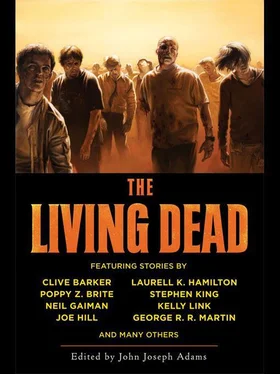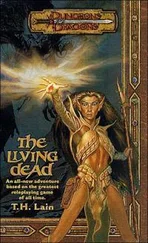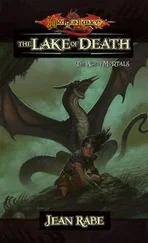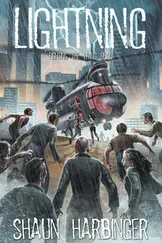The first bubbles had lifted themselves off the bottom of the pot and drifted up through the water to burst at the surface. On the radio, the report about the Special Forces in Mobile had ended, and the anchor was talking about sightings of eaters in places like Bangor, Carbondale, and Santa Cruz, which the local authorities were writing off as hysteria but at least some of which, the anchor said, there was disturbing evidence were true; in which case, they represented a new phase in what he called the Reanimation Crisis. From the living room, Brian yelped and said, “Scary!” which he did when something on the screen was too much for him; Robbie said, “It’s okay—Vi’s gonna get them out. Watch,” one of those grace notes your kids sound that makes you catch your breath, it’s so unexpected, so pure. There was a knock at the front door.
It sounded like a knock. When I rewind it and play it again in my mind, it still sounds like a knock, no matter how I try to hear it otherwise. None of the descriptions of the eaters mentioned anything about knocking. Besides, I hadn’t heard anyone’s gun going off, which I fully expected would announce the arrival of eaters in our neck of the woods. Of course, this was because everyone was watching the treeline behind the houses; I realize how ridiculous it sounds, how unforgivably stupid, but it never occurred to any of us that the eaters might walk right up to our front doors and knock on them. Or—I don’t know—maybe we were aware of the possibility, but assumed there was no way a single eater, let alone a truckload of them, could appear in the middle of the street without someone noticing.
I left the pot with the wisps of steam starting to curl off the water and walked down the front stairs to the door. At the top of the stairs, I thought it might be Ted home from work, but on the way down I decided it couldn’t be him, because he wouldn’t have bothered knocking, would he? It had to be a neighbor, probably the McDonald girls come to ask if Robbie wanted to go out and play with them. They were forever doing things like that, showing up five minutes before dinner and asking Robbie to play with them—which, the second she heard their voices, Robbie naturally was desperate to do. I tried to compromise, told Robbie she could go out for a little while after she was done with her food, or invited the McDonald girls to join us for dinner, but Robbie would insist she wasn’t hungry, or the McDonald girls would say they had already eaten, or were going to have pizza later, when their father brought it home. At which, Robbie would ask why we couldn’t have pizza, which Brian would hear and start chanting, “Piz-za! Piz-za! Piz-za!” Sometimes I let Robbie run out and kept a plate warm for her, let her eat with Ted and me when he got home, which she loved, being at the table with Mommy and Daddy and no little brother. Sometimes, though, I told the McDonald girls to return in half an hour, Roberta was sitting down to her dinner—and prepared myself for the inevitable storm of protests. I hadn’t made up my mind what my decision this time would be, but my stomach was clenching. I turned the lock, twisted the doorknob, and pulled the door open.
They say that time slows down in moments of crisis; for some people, maybe it does. For me, swinging that door in was like hitting the fast-forward button on the DVD player, when the images on the screen advance so fast they appear as separate pictures. One moment, I’m standing with the door in my hand and a trio of eaters on the front step. They’re women, about my age. I think—the one nearest me is missing most of her face. Except for her right eye, which is cloudy and blue and looks as if it’s a glass eye that’s been scuffed, I’m staring at bare bone adorned with tatters and shreds of muscle and skin. Her mouth—her teeth part, and I have the absurd impression she’s about to speak to me.
The next moment, I’m scrambling up the stairs backwards. I could leap them three at a time—I have in the past—but there’s no way I’m turning my back on the figures who have entered the house. The pair behind the faceless one don’t appear nearly as desiccated: their skin is blue-gray, and their faces show no expression, but compared to what’s raising her right foot to climb the stairs after me, they’re practically normal.
The moment after that, I’m in the kitchen, one hand reaching for the handle of the pot of water, which hasn’t come to full boil yet. Behind me, I can hear the stairs shifting under the eaters’ weight. I can smell them—God, everything I’ve heard about the way the things smell is true. I want to call to the kids, tell them to get in here with me, but it’s all I can do not to vomit.
That second, the second my fingers are closing around the handle—that’s the one I return to. When I replay the three minutes it took my life to disintegrate, I focus on me in the kitchen. I can’t remember how I got there. I mean, I know how I went from the stairs to the kitchen, I don’t know why. Once I reached the top of the stairs, it would have been easy enough to haul myself to my feet and run into the living room, to Robbie and Brian. We could have—I could have shoved the couch out from the wall, used it to delay the eaters while we ran for the back door—or even around them, back down the stairs and out the front door, or into the downstairs rec room. We could have barricaded ourselves in the garage. We—instead, I ran for the kitchen. I realize I must have been thinking about a weapon; I must have been searching for something to defend myself—us with, and the pot on the stove must have been the first thing that occurred to me. This has to be what made me choose the kitchen, but I can’t remember it. All I have is me on the stairs, and then my fingers curling around that piece of metal.
Which isn’t in my hand anymore; it’s lying on the kitchen floor, and Miss Skull-Face’s right eye has sagged downwards because the pot has collapsed her cheek where it struck it. The hot water doesn’t appear to have had any affect on her; although a couple of the pieces of flesh dangling from her face have fallen onto her blouse. She’s moving towards me fast, her hands outstretched, and I see that she’s missing two of the fingers on her left hand, the ring and pinkie, and I wonder if she lost them trying to prevent whoever it was from tearing off her face.
The next thing, I’m on the floor, on my back, which is numb. My head is swimming. Across the kitchen tiles from me, Miss Skull-Face struggles to raise herself from her back. At the time, I don’t know what’s happened, but I realize now the eater’s rush carried us into the wall, stunning us both. The other eaters are nowhere to be seen.
And then I’m on the other side of the kitchen island, which I’ve scooted around on my butt. I’m driving the heel of my left foot straight into the eater’s face, the shock of the impact traveling through the sole of my sneaker up my leg. I feel as much as hear the crunch of bone splintering. I’m as scared as I’ve ever been, but the sensation of the eater’s face breaking under my foot sends a rush of animal satisfaction through me. Although I’m intent on the web of cracks spreading out from the sudden depression where Miss Skull-Face’s nose and cheeks used to be, I’m aware that her companions are not in the kitchen.
I must—if I haven’t before, I must understand that the other eaters have left Miss Skull-Face to deal with me and turned in search of easier—of the—I know I pull myself off the floor, and I’m pretty sure I kick the same spot on the eater’s face with the toe of my sneaker, because afterwards, it’s smeared with what I think are her brains. What I remember next is—
(To the front, rear, left, and right of the theater, the air is full of screaming. At first, the sound is so loud, so piercing, that it’s difficult for anyone in the audience to do anything more than cover her or his ears. Mary raises her hands to either side of her head; it does not appear that the Stage Manager does, even as the screams climb the register from terror to pain. Muffled by skin and bone, the screams resolve themselves into a pair of voices. It is hard to believe that such noises could issue from the throats of anything human; they seem more like the shrieks of an animal being vivisected. As they continue for four, five, six seconds—an amount of time that, under other circumstances, would pass almost without notice but that, with the air vibrating like a plucked guitar string, stretches into hours—it becomes possible to distinguish the screams as a single word tortured to the edge of intelligibility, made the vessel for unbearable pain: “Mommy.”
Читать дальше
Конец ознакомительного отрывка
Купить книгу












